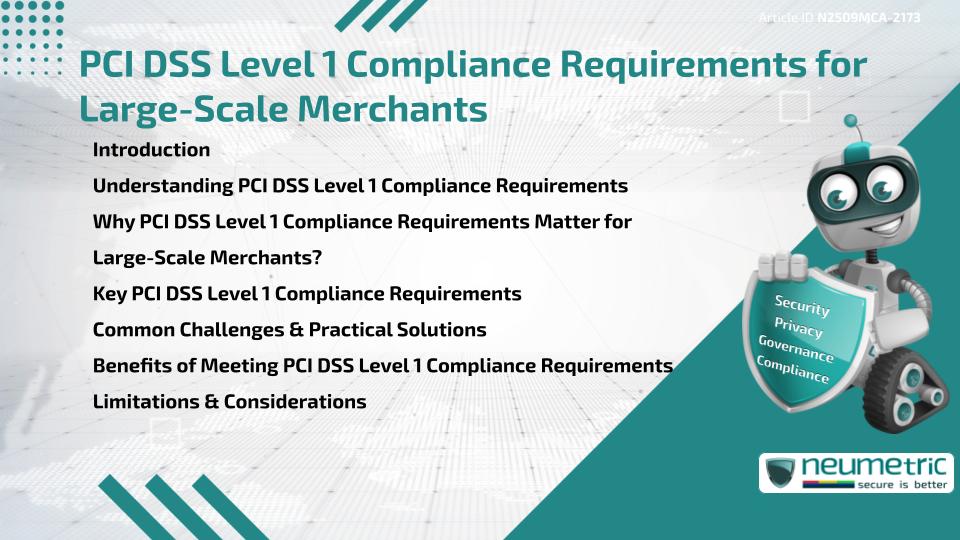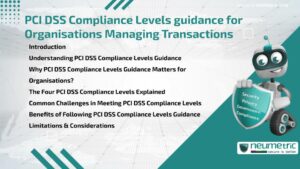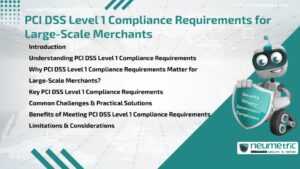Table of Contents
ToggleIntroduction
The PCI DSS Level 1 Compliance Requirements apply to Large-scale Merchants processing over six (6) million Card Transactions annually or those deemed high Risk by Payment Brands. Achieving Compliance ensures secure handling of Cardholder Data, reduces liability & builds Customer Trust. This article explains what these requirements include, why they matter & the benefits for Merchants.
Understanding PCI DSS Level 1 Compliance Requirements
The Payment Card Industry Data Security Standard [PCI DSS] defines Security obligations for all organisations handling Cardholder Data. Level 1 is the highest tier, requiring rigorous Assessments by Qualified Security Assessors [QSAs].
The PCI DSS Level 1 Compliance Requirements include comprehensive Technical, Procedural & Governance Controls to protect against Breaches & Fraud. For details, see the PCI Security Standards Council.
Why PCI DSS Level 1 Compliance Requirements Matter for Large-Scale Merchants?
Large Merchants are attractive Targets for Cybercriminals because of the Volume of Transactions they process. Compliance matters because it:
- Demonstrates adherence to Global Payment Security Standards.
- Reduces Risks of Breaches & Financial Fraud.
- Builds trust with Banks, Partners & Customers.
- Ensures Contractual & Regulatory obligations are met.
The ISACA Compliance resources stress PCI DSS as critical for Enterprise-scale Payment Security.
Key PCI DSS Level 1 Compliance Requirements
- Network Security – Install & Maintain Firewalls to Protect Systems.
- Cardholder Data Protection – Encrypt Cardholder Information in Storage & Transmission.
- Access Control – Limit Data access to Authorised Personnel only.
- Vulnerability Management – Regularly update Software & Apply Patches.
- Monitoring & Logging – Maintain Audit Logs & Monitor System activity.
- Testing Systems – Perform quarterly Vulnerability Scans & Annual Penetration Testing.
- Policy Framework – Establish & Enforce strong Information Security Policies.
- Onsite Audit – Undergo an annual QSA-led Audit with a Report on Compliance [ROC].
- Attestation of Compliance [AOC] – Submit as Proof of adherence to PCI DSS Level 1.
The NCSC UK Payment Security guidance reinforces these requirements for safeguarding Cardholder Data.
Common Challenges & Practical Solutions
- Complex Environments – Map Card Data flows to reduce Audit Scope.
- Vendor Dependencies – Ensure Service Providers also comply with PCI DSS.
- High Costs – Use Compliance Automation Tools to streamline processes.
- Evolving Standards – Stay updated with PCI DSS v4.0 requirements.
For guidance on addressing these issues, see ENISA Payment Security guidelines.
Benefits of Meeting PCI DSS Level 1 Compliance Requirements
- Regulatory Assurance – Ensures Compliance with Card Network mandates.
- Risk Reduction – Strengthens defences against Cyberattacks & Fraud.
- Business Advantage – Enhances credibility in Competitive Markets.
- Stakeholder Trust – Demonstrates Enterprise commitment to Payment Security.
Limitations & Considerations
The PCI DSS Level 1 Compliance Requirements are Rigorous, Costly & Resource-intensive. Compliance must be continuously maintained through regular Audits, Monitoring & Staff Training. Certification does not guarantee Complete Security but provides a strong foundation for managing Payment Risks.
Takeaways
- The PCI DSS Level 1 Compliance Requirements apply to Merchants processing over six (6) million Transactions annually.
- They cover Network Security, Encryption, Monitoring, Penetration Testing & Policy enforcement.
- Compliance reduces Risks, builds trust & ensures Regulatory assurance.
FAQ
What are the PCI DSS Level 1 Compliance Requirements?
They are the Highest-level Security obligations for Merchants processing over six (6) million Card Transactions annually.
Who conducts PCI DSS Level 1 Assessments?
Qualified Security Assessors [QSAs] perform Audits & Issue Compliance Reports.
What Documentation is required?
A Report on Compliance [ROC] and an Attestation of Compliance [AOC].
How often must Merchants comply?
Level 1 Merchants must undergo Annual Audits & Quarterly Scans.
Does Compliance prevent all Breaches?
No, but it significantly reduces Risks & Improves Security Posture.
References
- PCI Security Standards Council
- ISACA – Compliance Resources
- NCSC UK – Payment Security Guidance
- ENISA – Payment Security Guidelines
- IT Governance – PCI DSS Resources
Need help for Security, Privacy, Governance & VAPT?
Neumetric provides organisations the necessary help to achieve their CyberSecurity, Compliance, Governance, Privacy, Certifications & Pentesting needs.
Organisations & Businesses, specifically those which provide SaaS & AI Solutions in the Fintech, BFSI & other regulated sectors, usually need a CyberSecurity Partner for meeting & maintaining the ongoing Security & Privacy needs & requirements of their Enterprise Clients & Privacy conscious Customers.
SOC 2, ISO 27001, ISO 42001, NIST, HIPAA, HECVAT, EU GDPR are some of the Frameworks that are served by Fusion – a SaaS, multimodular, multitenant, centralised, automated, CyberSecurity & Compliance Management system.
Neumetric also provides Expert Services for technical Security which covers VAPT for Web Applications, APIs, iOS & Android Mobile Apps, Security Testing for AWS & other Cloud Environments & Cloud Infrastructure & other similar scopes.
Reach out to us by Email or filling out the Contact Form…





